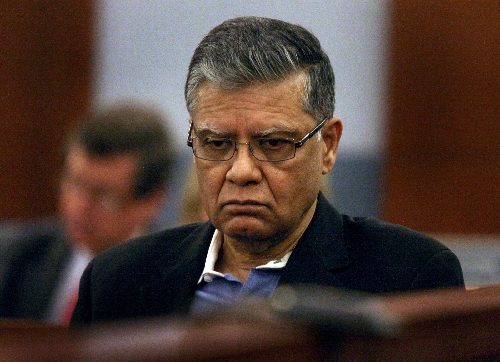Prosecutor says doctor in hepatitis C outbreak is faking disabilities.

Dr. Dipak Desai, the physician at the center of the hepatitis C outbreak, is faking his physical disabilities to obstruct the criminal case against him, a prosecutor argued Tuesday.
"Defendant Desai has ‘cried wolf’ too many times for this or any other court to take seriously his feigned impairment, absent some objective evidence to the contrary," Chief Deputy District Attorney Mike Staudaher wrote in court papers. "It is clear that Desai will go to great lengths in order to deceive those around him, and his continued malingering should not be tolerated."
Staudaher was summing up the sworn testimony Friday from three state medical experts who all said Desai exaggerated the effects of two strokes.
The three experts, part of the team that evaluated Desai for six months at Lake’s Crossing, the state’s secure mental hospital in Sparks, all concluded during their testimony that Desai was competent to stand trial on criminal charges stemming from the 2007 hepatitis C outbreak.
All three testified from Lake’s Crossing by video during a daylong hearing in Las Vegas before District Judge Kathleen Delaney. Desai’s lawyers sought the hearing to challenge the experts’ findings.
Delaney ordered both sides to submit written arguments by 5 p.m. Tuesday so that she can issue a ruling on whether to accept the state’s competency findings and order Desai to advance to trial on March 12.
Desai, 62, and two of his nurse anesthetists, Keith Mathahs and Ronald Lakeman, are facing felony charges, including racketeering, insurance fraud and neglect of patients. The charges revolve around seven people who authorities say were infected with the potentially deadly hepatitis C virus at Desai’s clinics.
In his court papers, Staudaher said Desai has a "long-standing history of conveniently appearing debilitated when it suits him.
"Because he was observed for such a long period during his confinement at Lake’s Crossing," Staudaher added, "the evaluators were able to see through the smoke screen of impairment that Desai presented to them when he knew they were watching."
Staudaher cited the observations of one hospital staffer who had a detailed conversation with Desai in August about politics. Desai told the staffer that President Barack Obama was practicing "Chicago politics" and should not have pushed his health care policy until the economy was stronger. He also talked about the merits of socializing health care.
But when Desai interacted with his evaluators, he supposedly "did not know who the president was … or anything else for that matter," Staudaher argued.
"Since Desai, according to the evaluators, is clearly malingering, the fact that he possesses the ability to maintain and portray such impairment whenever he is in front of his evaluators illustrates that he has more than sufficient understanding and ability to communicate."
In his written arguments, lead Desai lawyer Richard Wright said cross-examination of the Lake’s Crossing experts on Friday "revealed serious flaws in the evaluation process."
Those flaws included ignoring recommendations from previous medical experts for Desai to undergo "comprehensive" testing and treatment at Lake’s Crossing, Wright argued.
The Lake’s Crossing experts also incorrectly compared images of Desai’s brain and made inaccurate conclusions about his behavior at the state mental facility, Wright argued.
"The ability of Dipak Desai to survive and function in the milieu of the institutional setting and the handful of anecdotal incidents wherein he was able to communicate with staff cannot be fairly interpreted to mean that he can assist counsel in this complex prosecution," Wright said. "The original judicial finding of incompetency must stand and cannot be rejected based on the flawed conclusions of the Lake’s Crossing doctors."
On Friday, however, Dr. Steven Zuchowski, a psychiatrist who had the most contact with Desai during his Lake’s Crossing evaluation, testified that Desai did not cooperate fully with his evaluators and deliberately tried to make himself look bad.
Zuchowski acknowledged that strokes in 2007 and 2008 damaged Desai’s brain, causing him memory and other cognitive problems but said that he still "meets the requirements" to stand trial.
Sally Farmer, a clinical and forensic psychologist, testified that she, too, concluded Desai was exaggerating his physical impairments.
She said Desai scored so low on several tests that she came to the conclusion he was deliberately attempting to do poorly.
Contact Jeff German at jgerman@reviewjournal.com or 702-380-8135.












